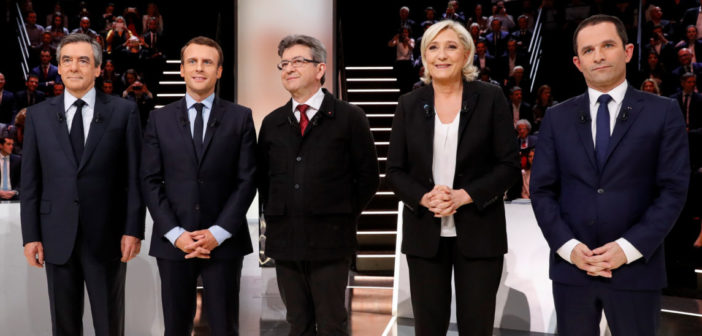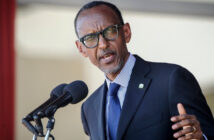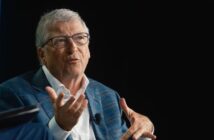The eyes of the world is riveted on France where about 47m voters are heading to the polls Sunday to choose their next president. Ahead of vote, which is being described as the most uncertain election ever in French politics, here’s a look at the key details.
France is the second-largest economy in the euro zone and one of the seven biggest across the world. Its president holds enough powers to influence the country’s economic and political path.
Furthermore, this election takes place at a time when the French people are increasingly concerned on security matters, after several terrorist attacks across the country, and disenchanted with high levels of unemployment and poor economic performance since the 2008 crisis.
France use the two-round voting system. A leader can be elected this Sunday if they win an outright majority but the polls suggest that this is unlikely. As a result, a run-off between the two leading candidates is expected and is scheduled for May 7.
Here are the candidates:
Emmanuel Macron, En Marche (On the Move)
At 39, he has a real chance of becoming France’s youngest-ever president because polls suggest if he reaches the run-off on 7 May he would defeat Marine Le Pen.
He is not an MP and has never stood for election before but his political rise has been meteoric. A brilliant student who went on to become an investment banker, Emmanuel Macron worked as economic adviser to President Hollande before taking up the post of economy minister in 2014.
He forged a reputation with his “Macron Law”, a controversial reform bill that allowed shops to open more often on Sundays and deregulated some sectors of industry. He championed digital start-ups and prompted a long-distance bus market.
He set up En Marche as “neither left nor right” in April 2016. Macron is married to his former French teacher Brigitte Trogneux, 24 years his senior, and has seven step-grandchildren.
Policy plans
€50bn (£43bn; $53bn) public investment plan to cover job-training, exit from coal and shift to renewable energy, infrastructure and modernisation
Reimbursement of full cost of glasses, dentures and hearing aids
Big cut in corporation tax and more leeway for companies to renegotiate 35-hour week
Cut in jobless rate to 7% (now 9.7%)
Ban on mobile phone use in schools for under-15s and a €500 culture pass for 18 year olds
Marine Le Pen, National Front (FN)
She took over the FN leadership from her father in January 2011 and came third in presidential elections the following year. She brought the party big electoral gains in regional elections in late 2015.
Marine Le Pen, 48, trained as a lawyer and headed the FN’s legal department. After years of fighting and losing French parliamentary elections, she was elected to the European Parliament in 2004 and remains an MEP, representing North-West France.
In 2010, before being elected leader, Marine Le Pen compared Muslims praying in the street to the German occupation. But since 2011 she has softened her tone and the FN has also tried to build bridges with the Jewish community.
As the election approached her position hardened again, with a pledge to suspend all legal immigration while new rules are drafted. She also caused outrage by wrongly suggesting that France had no responsibility for the Paris round-up of 13,000 Jews deported in World War Two.
She is twice divorced with three children, and lives in the western suburbs of Paris.
Policy plan
Negotiation with Brussels on a new EU, followed by a referendum
“Automatic” expulsion of illegal immigrants and legal immigration cut to 10,000 per year following an immediate total moratorium
“Extremist” mosques closed and priority to French nationals in social housing
Retirement age fixed at 60 and 35-hour week assured.
François Fillon, The Republicans
Since defeating Nicolas Sarkozy and Alain Juppé in his party’s primaries, he campaign has been dogged by controversy. He complained he was the victim of a “political assassination” and said the voices of “millions of votes have been muzzled”.
Despite the inquiry, he is not far behind the two front-runners in the polls and his campaign team remains confident.
Fillon, 62, studied law and married his Welsh wife, Penelope Clarke, in 1980 in Llanover, near Abergavenny. They have five children and their home is a 12th-Century manor house near Le Mans in western France.
Policy plans
To scrap half a million public sector jobs and the 35-hour work week
Removing the wealth tax (ISF)
To strip jihadists returning from the wars in Iraq or Syria of French nationality
Requiring parents in receipt of social allowances to agree to a “parental responsibility contract”, to tackle children’s absenteeism or behaviour “disrespectful of the values of the [French] republic”
Lifting EU sanctions on Russia and helping Syrian President Bashar al-Assad defeat so-called Islamic State (IS).
Jean-Luc Mélenchon, La France Insoumise (France unbowed)
He is among the four front-runners, polls suggest, and being hailed as a serious contender. He has seized the limelight with his razor-sharp wit during televised debates and impressed the public with his hi-tech use of holograms, projecting his image to rallies in six cities simultaneously.
Backed by France’s Communist Party, he says the means of production, trade and consumption must be changed, and cites climate change as one of his concerns.
A former supporter of European federalism, he argues that the EU’s economic liberalism and “ideological obsessions” with avoiding debt have sapped its ability to deliver democratic change.
Mélenchon, 65, left the Socialist Party in November 2008 to found the Left Party with French deputy Marc Dolez. He joined the Left Front electoral federation and was elected to the European Parliament in 2009, where he still serves.
Policy plans
Voting from age of 16 and a “Sixth Republic” to replace the existing presidential system
Constituent assembly to acquire greater powers, voted in by proportional representation
Renegotiate EU treaties in order to ditch austerity measures and enable the French state to pursue a massive, environment-friendly programme of state spending to stimulate the economy
Zero homelessness and full reimbursement for prescribed health care
Recognize burn-out as an occupational disease.
Benoît Hamon, Socialist Party
Renowned as a left-wing rebel within the Socialist party, ex-education minister Benoît Hamon decisively won the race for the party nomination, defeating former Prime Minister Manuel Valls.
Known as the “French Bernie Sanders”, Mr Hamon, 49, is struggling to make headway in the presidential race, partly because of competition from Jean-Luc Mélenchon. He has also struggled to secure broad support across a divided Socialist party.
Hamon’s partner is Gabrielle Guallar and the couple have two daughters.
Policy plans
To legalise cannabis and tax the wealth generated by robots that take the jobs of humans
To scrap a 2016 law making it easier to hire and fire workers
A basic income plan to boost salaries of those earning less than €2,185 per month
The unemployed would receive up to €600 per month and those on the minimum wage around €200
Renewable energy to form 50% of electricity by 2025 and pull out of nuclear energy by 2050.
Other candidates in the France presidential election include François Asselineau, 59, Union Populaire Républicaine (Popular Republic Union); Nathalie Arthaud, 46,Lutte Ouvrière (Workers’ Struggle); Jacques Cheminade, 75; Nicolas Dupont-Aignan, 55, Debout La France (Stand Up France); Philippe Poutou, 50, New Anti-Capitalist Party and Jean Lassalle, 61.




